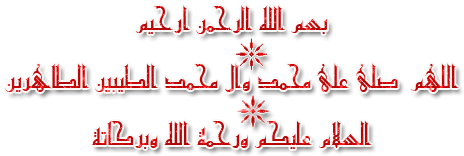
THE STORY OF IMAM AL BUKHARI
[ The power of a mother's love and the extraordinary intelligence of Al Imam Al Bukhari]
His father's name was Ismail bin Ibrahim bin al-Mughirah, who was a scholar of hadith experts.
However, since Bukhari was little his father had died and left knowledge for his son.
In an orphaned state, Imam Al Bukhari was then raised by his mother with love.
Imam Al Bukhari once experienced pain in his eyes when he was a child. Apparently, the illness caused him to go blind.
Facing this, Imam Al Bukhari's mother always prayed all night and day, with full honesty and tears, and always had good thoughts of Allah.
She did not give up and kept complaining to Allah about her son's blindness.
Until one night, when Bukhari's mother was asleep in her sleep, she dreamed of seeing Prophet Ibrahim AS who said to her.
"O woman, indeed Allah has restored your son's sight, because of your many cries or your many prayers."
After that, with the permission of Allah Imam Al Bukhari was finally able to see.
When Allah had restored Bukhari's vision, the mother tried hard to teach her son to travel around Islamic lands in search of the Prophet's hadiths with strong memorization.
⭐ Imam Bukhari was given extraordinary intelligence by Allah Subhanahu Wa Ta'alla.
It was Imam Al Bukhari who became the teacher of the teachers and retainer of the hadith experts.
Imam Bukhari's full name:
Abu Abdullah Muhammad bin Ismail bin Ibrahim bin Al-Mughirah bin Bardizbah Al-Bukhari.
Born in Bukhara, a city in Uzbekistan on 13 Shawwal 194 Hijri or 21 July 810 AD.
Because he came from Bukhara, he was nicknamed Imam Al Bukhari.
🗂 Imam Al Bukhari once said 2 things...
🖋 "I was inspired to easily memorize hadith, when I was still in Kuttab (a place to learn to read and write), when I was 10 years old or less".
🖋 "I will not narrate the hadith that I received from friends and tabi'in, until I know the date of birth, day of death and place of residence.
I also will not narrate the mauquf hadith from Companions and Tabi'in, unless there is a basis that I know from the Book of Allah (Al Qur'an) and the sunnah of the Prophet Shallallaahu 'alayhi wa sallam."
📋 In a scientific and practical trip for 16 years, Imam Bukhari met and studied directly with 4000 teachers .
With patience in ascertaining the hadith of the noble Prophet, the long journey finally made Imam Al Bukhari able to collect at least 600,000 hadiths.
Of these, 300,000 of them are memorized.
The memorized hadiths consist of 200,000 invalid hadiths and 100,000 authentic hadiths
📗 Imam Bukhari has written quite a lot, including:
Al-Jami' Ash-Sahih.
This work is called by the name of Al-Jami 'Ash-Sahih Al-Musnad min Hadith Rasulullah SAW sunnatihi wa Ayyamihi.
Sometimes called Al-Jami' Al-Musnad Al Shahih Al-Mukhtashr min Umar Rasulullah wa Sunanih wa Ayyamihi or commonly called "Sahih Al Bukhari".
His book, Sahih Al-Bukhari is also the most authentic book after the Qur'an.
Namely a collection of authentic hadith that he prepared for 16 years.
☀ Al-Allamah Al-Aini Al-Hanafi said,
"Imam Al Bukhari is a hafiz, intelligent, clever and careful.
He has the ability to explain observantly, the ability to remember it is well known and witnessed by reliable scholars."
☀ Imam Muslim once met Imam al-Bukhari, then he kissed his forehead and said,
"Let me kiss your feet, O ustadh of ustadh, leaders of hadith experts, and doctors in analyzing defects in hadith."
📙 Imam Bukhari died at the age of 62 years less than 13 days on Friday night, coinciding with the night of Eid al-Fitr.
He was buried after the midday prayer in 256 Hijri in the village of Khartank which is located close to Samarkand, which is now known as Uzbekistan.


Music is prohibited in islaam
Haram is an Arabic word which means “Forbidden”. Haram is the things which are prohibited in the Quran and the Sunnah, MUSIC is one of them.
PROHIBITION OF MUSIC IN QURAN AND AHADEETH
Proofs from Quran:
1) Allah Ta’ala mentions:
وَمِنَ ٱلنَّاسِ مَن یَشۡتَرِی لَهۡوَ ٱلۡحَدِیثِ لِیُضِلَّ عَن سَبِیلِ ٱللَّهِ بِغَیۡرِ عِلۡمࣲ وَیَتَّخِذَهَا هُزُوًاۚ أُو۟لَـٰۤىِٕكَ لَهُمۡ عَذَابࣱ مُّهِینࣱ
[Surah Luqmān: 6]
“There are some who purchase futile discourse to deviate from Allah’s path without knowledge and they mock it [the path of Allah, Islam]. There shall be a humiliating punishment for these people”
(Surah Luqman, verse: 6)
Abdullah Ibn Mas’ud,, Abdullah Ibn ‘Abbas, Jabir ‘Ikrimah, Sa’id ibn Jubayr,(may Allah be pleased with them) Mujahid, Makhul and Hasan Al Basri (rahimahumullah) were all of the view that ‘futile discourse’ refers to music/ musical instruments.
‘Abdullah ibn Mas’ud (radiyallahu ‘anhu) took an oath that this verse is referring to music.
[Refer: Tafsir Ibn Abi Hatim, Tafsirul Baghawi -Ma’alimut Tanzil- and Tafsir Ibn Kathir, Surah Luqman, Verse: 6. Also see Al Adabul Mufrad of Imam Bukhari, Hadith: 1265 and As Sunanul Kubra of Imam Bayhaqi, vol. 10 pg. 221]
2) Allah Ta’ala said, while addressing Shaytan:
وَٱسۡتَفۡزِزۡ مَنِ ٱسۡتَطَعۡتَ مِنۡهُم بِصَوۡتِكَ وَأَجۡلِبۡ عَلَیۡهِم بِخَیۡلِكَ وَرَجِلِكَ وَشَارِكۡهُمۡ فِی ٱلۡأَمۡوَ ٰلِ وَٱلۡأَوۡلَـٰدِ وَعِدۡهُمۡۚ وَمَا یَعِدُهُمُ ٱلشَّیۡطَـٰنُ إِلَّا غُرُورًا
[Surah Al-Isrāʾ: 64]
And incite [to senselessness] whoever you can among them with your voice and assault them with your horses and foot soldiers and become a partner in their wealth and their children and promise them. But Satan does not promise them except delusion.
(Surah Al Isra, verse: 64)
Mujahid (rahimahullah), who was known as a leader in Tafsir and was a student of Abdullah ibn ‘Abbas (radiyallahu ‘anhuma) explains ‘with your voice’ to mean music, musical instruments and all futility.
[Tafsir Ibn Abi Hatim, Surah Al Isra, verse: 64]
3) Allah Ta’ala when describing his true bondsmen says:
{ وَٱلَّذِینَ لَا یَشۡهَدُونَ ٱلزُّورَ وَإِذَا مَرُّوا۟ بِٱللَّغۡوِ مَرُّوا۟ كِرَامࣰا }
[Surah Al-Furqān: 72]
“And those who do not engage in acts of deceit and when they pass by futile acts, they pass be gracefully [without participating]”
[Surah Furqan, verse: 72]
Muhammad ibn Al Hanafiyyah (rahimahullah) states that ‘acts of deceit’ refers to futile acts and music
[Tafsir Ibn Kathir, Surah Furqan, verse: 72]
Proofs from Ahadeeth:
1) Messenger of Allah peace be upon him said:
قَالَ حَدَّثَنِي أَبُو عَامِرٍ ـ أَوْ أَبُو مَالِكٍ ـ الأَشْعَرِيُّ وَاللَّهِ مَا كَذَبَنِي سَمِعَ النَّبِيَّ صلى الله عليه وسلم يَقُولُ " لَيَكُونَنَّ مِنْ أُمَّتِي أَقْوَامٌ يَسْتَحِلُّونَ الْحِرَ وَالْحَرِيرَ وَالْخَمْرَ وَالْمَعَازِفَ، وَلَيَنْزِلَنَّ أَقْوَامٌ إِلَى جَنْبِ عَلَمٍ يَرُوحُ عَلَيْهِمْ بِسَارِحَةٍ لَهُمْ، يَأْتِيهِمْ ـ يَعْنِي الْفَقِيرَ ـ لِحَاجَةٍ فَيَقُولُوا ارْجِعْ إِلَيْنَا غَدًا. فَيُبَيِّتُهُمُ اللَّهُ وَيَضَعُ الْعَلَمَ، وَيَمْسَخُ آخَرِينَ قِرَدَةً وَخَنَازِيرَ إِلَى يَوْمِ الْقِيَامَةِ ".
رواه البخاري
“Soon there will be people from my Ummah who will regard adultery, wearing silk garments, wine and musical instruments as lawful…’
[Sahih Bukhari -Ta’liqan- بصيغة الجزم, Hadith: 5590, Sahih Ibn Hibban; Al Ihsan, Hadith: 6754 and As Sunanul Kubra of Imam Bayhaqi, vol. 10 pg. 221]
2) Another hadith Prophet peace be upon him said:
وعن أنس بن مالك رضي الله عنه قال: قال رسول الله صلى الله عليه وسلم: صوتان ملعونان في الدنيا والآخرة: مزمار عند نعمة ورنة عند مصيبة
رواه البزار ورواته ثقات
- ابن حجر الهيتمي، قال في الزواجر: ورواته ثقات
“Two types of sounds are cursed in this world and in the Hereafter, Musical instruments when expressing happiness over a bounty and wailing when a calamity befalls”
[Musnadul Bazzar, Hadith: 7513, with a reliable chain. Refer: Targhib, vol. 4 pg. 350 and Majma’uz Zawaid, vol. 3 pg. 13]
عَنْ سُلَيْمَانَ بْنِ مُوسَى، عَنْ نَافِعٍ، قَالَ سَمِعَ ابْنُ عُمَرَ، مِزْمَارًا - قَالَ - فَوَضَعَ أُصْبُعَيْهِ عَلَى أُذُنَيْهِ وَنَأَى عَنِ الطَّرِيقِ وَقَالَ لِي يَا نَافِعُ هَلْ تَسْمَعُ شَيْئًا قَالَ فَقُلْتُ لاَ . قَالَ فَرَفَعَ أُصْبُعَيْهِ مِنْ أُذُنَيْهِ وَقَالَ كُنْتُ مَعَ النَّبِيِّ صلى الله عليه وسلم فَسَمِعَ مِثْلَ هَذَا فَصَنَعَ مِثْلَ هَذَا
رواه ابو داود صحيح الالباني
3) And Once Abdullah ibn Umar (may Allah be pleased with him) heard a musical instrument being played. He placed his fingers in his ears and veered off to one side of the road. He then asked Nafi’: ‘Can you hear anything’? Nafi’ replied: ‘No’. He then took his fingers out of his ears and said: I was with,Prophet (sallallahu ‘alayhi wa sallam), and he also did the same when he heard a musical instrument being played.
[Sunan Abi Dawud, Hadith: 4924. Declared authentic (sahih) by Hafiz Ibn Hibban; Al Ihsan, Hadith: 693]


A woman’s du’a for her future husband
وَٱلَّذِینَ یَقُولُونَ رَبَّنَا هَبۡ لَنَا مِنۡ أَزۡوَ ٰجِنَا وَذُرِّیَّـٰتِنَا قُرَّةَ أَعۡیُنࣲ وَٱجۡعَلۡنَا لِلۡمُتَّقِینَ إِمَامًا
[Surah Al-Furqān: 74]
And those who say, Our Lord, grant us from among our wives and offspring comfort to our eyes [[i.e., a source of happiness due to their righteousness. and make us a leader [i.e., example] for the righteous.
O Allah! Please grant me the one, who will be the garment for my soul.
Who will satisfy half of my deen. And in doing so make me whole.
Make him righteous and on Your path. In all he’ll do and speak.
And sprinkle water on me at Fajr, reminding me to pray.
May he earn from halal sources, and spend within his means.
May he seek Allah’s guidance always, to fulfill all his dreams.
May he always refer to Qur’an and the Sunnah as his moral guide.
May he thank and appreciate Allah. For the woman at his side.
May he be conscious of his anger and often fast and pray.
Be charitable and sensitive, in every possible way!
May he honor and protect me and guide me in this life.
And please Allah! Make me worthy to be his loving wife.
And finally, O Allah! Make him abundant in love and laughter.
In taqwa and sincerity. In striving for the hereafter!
May Allah grant all the Muslim sisters with such husbands!
Dear Allah........🤲
I trust your plan more than I trust mine even though it hurts right now... I trust you will lead me to the best possible outcome... Until then, please help me keep sabr and hold onto my faith... Please don't leave me alone, even for the blink of an eye...
Your humble believer! 😊
#Ameen 🤲


Perhaps you hate a thing that is good for you
كُتِبَ عَلَیۡكُمُ ٱلۡقِتَالُ وَهُوَ كُرۡهࣱ لَّكُمۡۖ وَعَسَىٰۤ أَن تَكۡرَهُوا۟ شَیۡـࣰٔا وَهُوَ خَیۡرࣱ لَّكُمۡۖ وَعَسَىٰۤ أَن تُحِبُّوا۟ شَیۡـࣰٔا وَهُوَ شَرࣱّ لَّكُمۡۚ وَٱللَّهُ یَعۡلَمُ وَأَنتُمۡ لَا تَعۡلَمُونَ
[Surah Al-Baqarah: 216]
Battle has been enjoined upon you while it is hateful to you. But perhaps you hate a thing and it is good for you; and perhaps you love a thing and it is bad for you. And Allāh knows, while you know not .
Al Baqarah :216
Yusuf ﷺ didn’t want to be thrown into the well, but it was best for him.
Musa’s mother didn’t want her son to end up in Firawn’s castle, but it was best for them.
The Sahaabah didn’t want to be prevented from Hajj during the treaty of Hudaybiyyah, but it was best for them.
Haajarah didn’t want to be left in the desert, but it was best for her.
Hence you and I need to understand that when we don’t get what we want, perhaps it’s Allahs way of giving us what we need.
Allah's plan is worth the wait.
Patience is the key to unlocking the
extraordinary blessings that lie ahead.
Trust in Allah's perfect plan.
May Allah give us the sense of humour to wait for the plans He have for us.
Ameen ..








